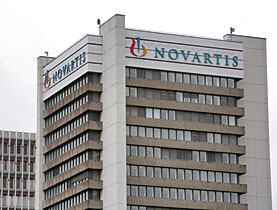Small shareholders reject Novartis-Alcon deal

The proposed total takeover of Alcon by Novartis has been thrown into doubt by a rebellion of disgruntled minority shareholders of the eye care company.
Pharmaceutical giant Novartis announced last week that it would complete the acquisition of Nestlé’s controlling stake in Alcon. But a plan to buy out the remaining 23 per cent of shares has been met with a legal challenge.
Minority shareholders have begun filing class action lawsuits in the United States, complaining that they are being offered less cash for their stake than Nestlé.
Alcon is backing the argument and has set up a committee of independent directors to protect the rights of smaller shareholders. The committee has yet to submit a full report but it has already stated its disappointment at what it terms a “coercive takeover bid” from Novartis.
The gradual takeover of Alcon by Basel-based Novartis began in 2008 when it acquired a 25 per cent stake in the company from Swiss food giant Nestlé. Last week Novartis triggered an option to buy Nestlé’s remaining 52 per cent stake for $28.1 billion (SFr28.6 billion), bringing the total cost of the deal to $38.5 billion.
Legal conundrum
However, it is the proposal to sweep up the remaining shares to take complete control of Alcon that has generated such controversy.
Novartis said it would be in everyone’s interests to “simplify Alcon’s ownership structure”, but it would offer small stakeholders around 15 per cent less for their shares. Or as Novartis put it: Novartis were offering Nestlé a premium for having the controlling stake.
The ensuing row has thrown up differences in Swiss stock market rules compared with most other countries. It has also presented a legal conundrum because Alcon is domiciled in Switzerland but listed on the New York stock exchange.
In Switzerland, the acquisition of a majority stake in a company normally triggers a mandatory offer to buy the shares of minority shareholders.
The purpose of this, according to Zurich University professor Karl Hofstetter who helped draft the rules, is to give small stakeholders the chance to get out if they do not have faith in the new owners.
Jurisdiction drama
The mandatory buyout principle also applies in the European Union, but Switzerland has included a clause that allows the buyer to offer up to 25 per cent less to minority shareholders. This Swiss twist goes some way to redressing the balance between majority and minority shareholders, according to Hofstetter.
Novartis claims that the deal complies with the Swiss Merger Act because Alcon is domiciled in Switzerland. According to Hofstetter, this law does not relate to the public bid but can be used to squeeze out minority shareholders if an acquirer holds at least a 90 per cent stake in a company.
The legal issue that appears to be at stake is whether Swiss or US regulations should apply to the Novartis bid to gain control of the last remaining shares in Alcon. This would go some way to determining the price that minority stakeholders should receive for their shares.
Principles at stake
Should it come to a full-blown legal fight and the courts side with Alcon’s minority shareholders, it could severely dent Novartis’s plans for its new acquisition. Novartis would still have control of the company and would enhance its access to the lucrative eye care market.
Even with a 77 per cent stake in Alcon, Novartis believes it could generate $200 million annual pre-tax cost-saving synergies with its own eye care business within three years.
But it would also be forced to pay annual dividends to other shareholders in line with profits. Attempts to chip away at the outstanding 23 per cent of shares at a later date could also prove more costly than acquiring them all en bloc in the near future.
Novartis has hinted it could force through its plan to buy out minority shareholders once it has obtained the full 77 per cent stake from Nestlé. The pharmaceutical firm has pointed out that the plan would need only a two-thirds majority of Alcon shareholders.
The Alcon independent committee has expressed alarm at such an idea. “Such a unilateral action would clearly be inconsistent with the minority [shareholder] protection principles upon which Alcon established itself and Alcon shareholders rely,” the committee said in a recent statement.
Matthew Allen, swissinfo.ch
Novartis was created in 1996 through the merger of Ciba-Geigy and Sandoz, and is currently organised into four divisions.
The company, which employees 96,700 full-time staff, recorded a net profit of $6.1 billion (SFr6.2 billion) in the first nine months of 2009 – down 8% from the corresponding period in 2008.
Part of the profit slump was put down to Alcon-related financing costs.
Alcon was founded in Fort Worth, Texas in 1945 and was purchased by Nestlé in 1977. The company was spun off in 2002 and is listed on the New York Stock Exchange.
The company is incorporated in Hünenberg, canton Zug, and has offices in Forth Worth, Texas.
Alcon has 15,000 employees and posted net profits of $1.55 billion in the first nine months of 2009.
Alcon and Novartis’s eye care business would cover 70% of the global vision care sector when combined, according to Novartis.

In compliance with the JTI standards
More: SWI swissinfo.ch certified by the Journalism Trust Initiative












You can find an overview of ongoing debates with our journalists here . Please join us!
If you want to start a conversation about a topic raised in this article or want to report factual errors, email us at english@swissinfo.ch.